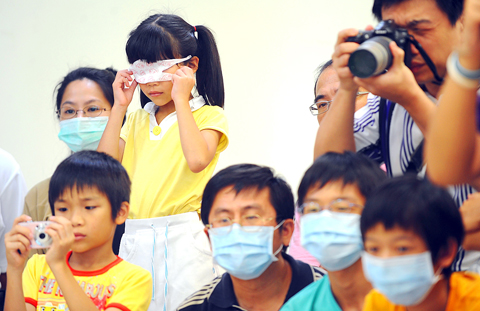The number of confirmed cases of severe swine flu in Taiwan rose by 10 yesterday, including a six-month-old girl, the Central Epidemics Command Center said yesterday.
Among the 10 new cases, five involved children under the age of 12, Centers for Disease Control Director-General Steve Kuo (郭旭崧) said. As of yesterday, confirmed fatalities from swine flu stood at seven, with 45 people still hospitalized.
Kuo said parents should wash their hands and change their clothes before holding a baby. Parents were also advised to refrain from taking their baby to crowded and confined areas.

PHOTO: LIU HSIN-DE, TAIPEI TIMES
Parents who develop flu-like symptoms should wear a mask and avoid contact with their baby, Kuo said. Babies suffering from shortness of breath, drowsiness, or purple lips or skin must seek immediate medical assistance, he said.
Kuo said the government had not changed its policy of excluding infants six months old or younger from inoculation, as it is the international norm.
Meanwhile, the Ministry of Education reached a consensus with colleges and universities on Friday to apply its “325” class suspension policy to university freshmen amid fear of outbreaks on campuses.
Vice Minister of Education Lu Mu-lin (呂木琳) told reporters after a meeting with deans of student affairs of colleges and universities nationwide that classes for freshmen at universities and those for freshmen, sophomores and juniors at colleges had to be suspended for up to five days if two students within the same class are diagnosed with the swine flu within three days of each other.
The policy has been in effect at primary, junior high and high schools across the country since the new semester began on Monday last week.
Lu said medical or nursing schools could draw up their own class suspension standards after discussing the matter with academics and health experts.
Lu said colleges and universities should advise their students to stay at home if they are infected with the flu.
Schools should also establish a mechanism to report confirmed cases to the ministry, Lu said.
Ho Cho-fei (何卓飛), director of the ministry’s Department of Higher Education, said universities and colleges should provide thermometers to students living in dormitories so that they could monitor their health.
Schools are also required to provide housing for students infected with the flu but who are unable to return home, and to check on students regularly, Ho said.
Students who have developed flu symptoms should be babarred from taking part in school activities until 24 hours after the symptoms have disappeared, Ho said.
In related developments, the Kaohsiung City Education Bureau said 26 classes at 24 schools had been suspended because of the flu.

Taiwanese can file complaints with the Tourism Administration to report travel agencies if their activities caused termination of a person’s citizenship, Mainland Affairs Council Minister Chiu Chui-cheng (邱垂正) said yesterday, after a podcaster highlighted a case in which a person’s citizenship was canceled for receiving a single-use Chinese passport to enter Russia. The council is aware of incidents in which people who signed up through Chinese travel agencies for tours of Russia were told they could obtain Russian visas and fast-track border clearance, Chiu told reporters on the sidelines of an event in Taipei. However, the travel agencies actually applied

New measures aimed at making Taiwan more attractive to foreign professionals came into effect this month, the National Development Council said yesterday. Among the changes, international students at Taiwanese universities would be able to work in Taiwan without a work permit in the two years after they graduate, explainer materials provided by the council said. In addition, foreign nationals who graduated from one of the world’s top 200 universities within the past five years can also apply for a two-year open work permit. Previously, those graduates would have needed to apply for a work permit using point-based criteria or have a Taiwanese company

The Shilin District Prosecutors’ Office yesterday indicted two Taiwanese and issued a wanted notice for Pete Liu (劉作虎), founder of Shenzhen-based smartphone manufacturer OnePlus Technology Co (萬普拉斯科技), for allegedly contravening the Act Governing Relations Between the People of the Taiwan Area and the Mainland Area (臺灣地區與大陸地區人民關係條例) by poaching 70 engineers in Taiwan. Liu allegedly traveled to Taiwan at the end of 2014 and met with a Taiwanese man surnamed Lin (林) to discuss establishing a mobile software research and development (R&D) team in Taiwan, prosecutors said. Without approval from the government, Lin, following Liu’s instructions, recruited more than 70 software

Chinese spouse and influencer Guan Guan’s (關關) residency permit has been revoked for repeatedly posting pro-China videos that threaten national security, the National Immigration Agency confirmed today. Guan Guan has said many controversial statements in her videos posted to Douyin (抖音), including “the red flag will soon be painted all over Taiwan” and “Taiwan is an inseparable part of China,” and expressing hope for expedited reunification. The agency last year received multiple reports alleging that Guan Guan had advocated for armed reunification. After verifying the reports, the agency last month issued a notice requiring her to appear and explain her actions. Guan